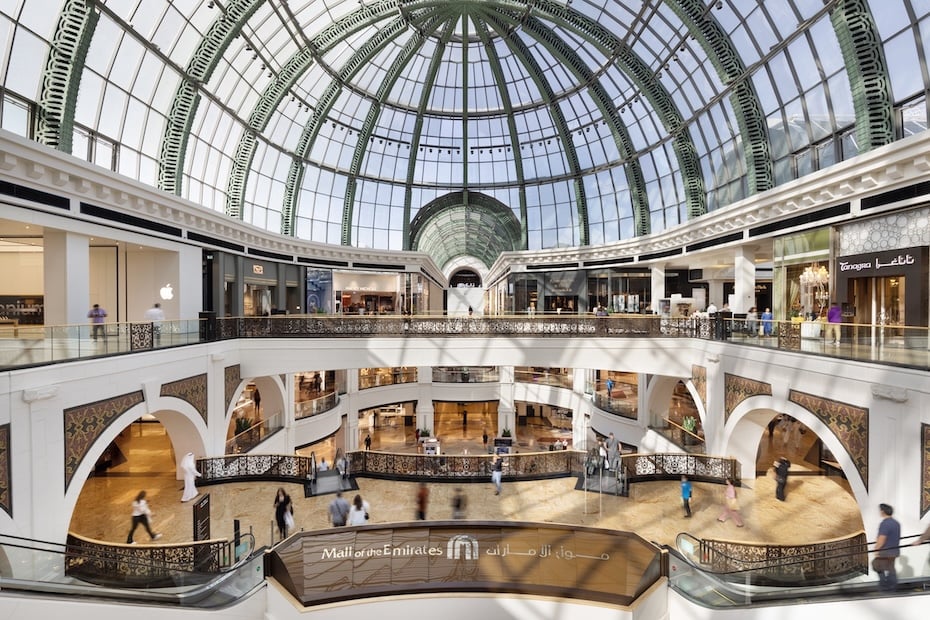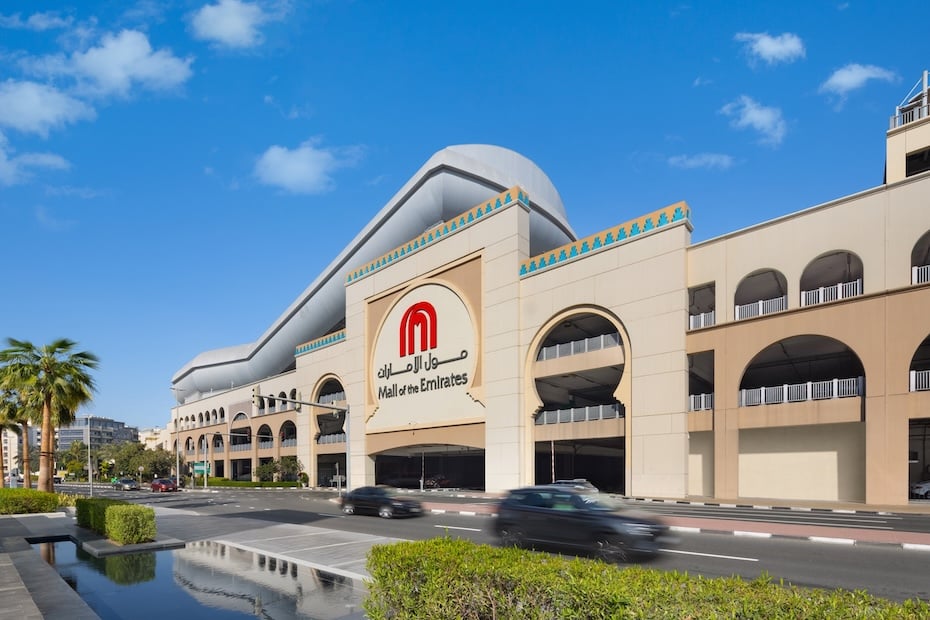Dubai’s retail sector is poised for a remarkable transformation, with Majid Al Futtaim’s recently announced AED 5 billion expansion of the iconic Mall of the Emirates serving as just one indicator of the ambitious growth trajectory ahead. This significant investment reflects broader trends reshaping the emirate’s retail landscape as it continues to position itself as a global shopping destination.
Dubai’s Mega Mall Renaissance
The Mall of the Emirates expansion represents more than just additional square footage; it signals Dubai’s unwavering commitment to retail innovation. As one of the city’s flagship shopping destinations, already famous for its indoor ski slope and luxury retail offerings, this expansion aims to further elevate the shopping experience to meet evolving consumer expectations.
This development comes amid several other major retail projects across the emirate. Dubai Mall, already one of the world’s largest shopping centers, continues to refine its offerings, while newer developments like Dubai Hills Mall and the upcoming Meydan One Mall demonstrate the continued appetite for retail space.

Also Read: Dubai’s New 5-Year Visa: Rules, Benefits, and Application Process
Beyond Square Footage: Experience-Driven Retail
What’s driving these expansions isn’t simply a desire for more retail space but rather a fundamental shift in what consumers expect from shopping destinations. Today’s Dubai shopper increasingly values:
- Immersive experiences that blend entertainment with shopping
- Technologically integrated retail environments
- Sustainable and environmentally conscious retail spaces
- Authentic local experiences alongside global brands
The most successful mall expansions are those recognizing that modern retail must offer something that online shopping cannot – memorable, multi-sensory experiences that transform shopping from a transaction into an event.
Digital Integration: The Omnichannel Revolution
Dubai’s retailers are increasingly embracing omnichannel strategies that seamlessly blend physical and digital shopping experiences. QR codes linking to extended product information, virtual try-on capabilities, and mobile apps that enhance in-store navigation are becoming standard features.
The city’s retail sector is also witnessing the rise of “phygital” retail concepts – physical stores enhanced by digital technologies that create more personalized and interactive shopping journeys. These innovations are particularly appealing to Dubai’s tech-savvy population and its millions of international visitors.

Also Read: Freelancer Visa In UAE: Comprehensive Guide to Free Zones
Changing Consumer Demographics
Dubai’s retail landscape is also responding to demographic shifts. The emirate’s growing population of young professionals and families is creating demand for retail environments that serve as community hubs rather than just shopping destinations. Meanwhile, the return of tourism to pre-pandemic levels brings a diverse international clientele with distinct preferences and expectations.
Successful retail expansions are increasingly designed with these varied demographic segments in mind, offering specialized zones and services catering to specific customer profiles.
Sustainability: The New Retail Imperative
Environmental consciousness is reshaping retail development in Dubai. New mall expansions increasingly incorporate sustainable design elements, from energy-efficient systems to recycled building materials. Retailers themselves are responding to growing consumer demand for ethical products and transparent supply chains.
This sustainability focus aligns with Dubai’s broader vision of becoming a smart, sustainable city of the future, as outlined in initiatives like the Dubai Clean Energy Strategy 2050.
Looking Ahead: Dubai’s Retail Future
As Dubai continues to evolve as a global retail hub, we can expect to see:
- Further integration of AI and IoT technologies in retail environments
- More localized and authentic experiences amid global offerings
- Continued emphasis on sustainability and ethical retail
- Retail spaces that double as community gathering points
The AED 5 billion Mall of the Emirates expansion exemplifies Dubai’s forward-thinking approach to retail – one that recognizes changing consumer behaviors while continuously reinventing the shopping experience. In a city known for embracing the future, retail remains not just a commercial activity but a vital part of Dubai’s identity and visitor appeal.
As global retail trends continue to evolve, Dubai’s willingness to invest, innovate, and reimagine its retail offerings ensures it will remain at the forefront of the industry for years to come.

Also Read: Dubai Trade Scam: Indian Firm ‘Dynamic’ Vanishes with AED 12 Million
Conclusion: Dubai’s Retail Renaissance
As Dubai navigates the evolving retail landscape, its ambitious mall expansions—led by flagship projects like the AED 5 billion Mall of the Emirates development—represent more than just commercial ventures. They embody the emirate’s vision of retail as an integral component of its identity as a global destination.
The future of Dubai’s retail sector will be defined by its ability to balance technological innovation with authentic experiences, sustainability with luxury, and global appeal with local relevance. The most successful retail developments will be those that recognize shopping centers as not merely places of commerce but as cultural hubs, entertainment venues, and community gathering spaces.
For investors, retailers, and consumers alike, Dubai’s retail evolution presents tremendous opportunities. The city’s willingness to embrace change while building on its established strengths positions it uniquely to weather global retail disruptions and emerge as a model for the future of physical retail in an increasingly digital world.
As Dubai continues its retail transformation, one thing remains clear: in a city that has always defied convention, shopping will never be just shopping—it will be an ever-evolving experience that continues to surprise, delight, and redefine what retail can be in the 21st century.
How will Dubai’s retail sector balance the growth of e-commerce with its massive physical retail expansions?
Dubai’s approach to balancing e-commerce and physical retail is increasingly focused on complementary integration rather than competition. The city’s retailers and mall operators are adopting sophisticated omnichannel strategies where physical locations serve as experiential showcases, fulfillment centers, and brand-building destinations that complement online shopping. The AED 5 billion Mall of the Emirates expansion, for instance, is likely to incorporate features like seamless mobile integration, click-and-collect facilities, and interactive technology that bridges digital and physical experiences. This strategy recognizes that modern consumers don’t think in terms of online versus offline—they expect a unified retail experience that leverages the strengths of both channels.
What role will sustainability play in Dubai’s future retail developments?
Sustainability is rapidly transitioning from a nice-to-have feature to a core requirement in Dubai’s retail development strategy. Future projects will increasingly incorporate green building standards, energy-efficient systems, and waste reduction initiatives as both regulatory requirements and market differentiators. We’re likely to see more mall developments featuring solar panels, advanced water conservation systems, and sustainable materials. Additionally, consumer-facing sustainability initiatives—like plastic-free shopping options, recycling programs, and transparency about environmental impact—will become standard offerings. This shift aligns with both global retail trends and Dubai’s broader sustainability vision, including its Clean Energy Strategy 2050 and commitment to reducing its carbon footprint despite ambitious growth plans.
How are changing demographics influencing Dubai’s retail landscape?
Dubai’s retail sector is becoming increasingly sophisticated in how it segments and serves its diverse customer base. The city’s growing population of young professionals, families, and long-term residents is creating demand for retail environments that function as community hubs with everyday conveniences alongside luxury offerings. Meanwhile, the tourism sector brings visitors with different shopping priorities, from luxury goods to authentic local experiences. Forward-thinking retail developments are responding with more nuanced approaches—creating distinct zones within malls to serve different demographic segments, offering specialized services for specific customer profiles, and using data analytics to better understand and respond to evolving consumer preferences. This demographic awareness is reshaping everything from tenant mix to mall design to marketing strategies across Dubai’s retail sector.

